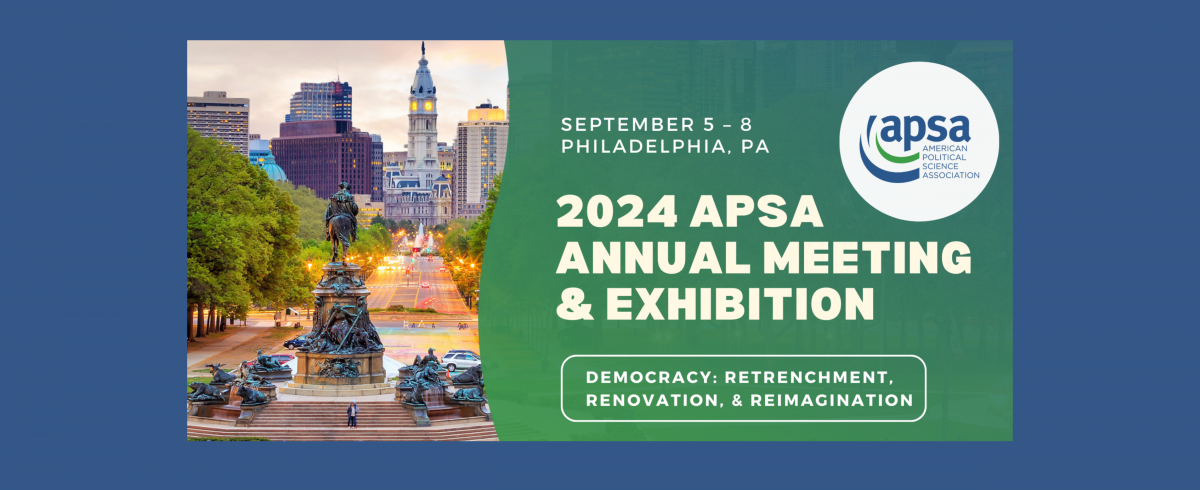le portail de la science politique française
le portail de la science politique française

Du 5 au 8 septembre 2024 se tiendra l’APSA Annual Meeting & Exhibition à Philadelphie sur le thème “Democracy: Retrenchment, Renovation, & Reimagination”. Lors de cette rencontre de l’Association américaine de science politique, deux panels seront organisés en partenariat avec l’AFSP. En effet, depuis 2010, l’Association Française de Science Politique est « related group » de l’APSA, en partenariat avec le French Politics Group. Les sessions, qui se tiendront les 6 et 7 septembre, seront deux tables rondes consacrées aux libertés académiques.
120th APSA Annual Meeting & Exhibition
👉 Inscriptions à tarifs préférentiels jusqu’au 10 juillet !
Inscriptions en ligne ici…
Threats to Academic Freedom: A Comparative Approach
Fri, September 6, 10:00 to 11:30am, TBA
Session Submission Type: Roundtable
Session Description
Researchers around the world are confronted with increasingly prevalent challenges – be they ethical, legal, political or security related – that limit their ability to access certain areas or constrain the way they address their research subjects or interlocutors. While such restrictions on academic freedom are undoubtedly more visible in authoritarian regimes, they do not spare democracies. Europe and the United States are emblematic cases. In Europe, two former communist countries that joined the European Union twenty years ago have distinguished themselves in recent years by their determination to hinder (in Poland) or even bring to heel (in Hungary) intellectuals and academics in particular. By reforming its Academy of Sciences and the governance of universities, by expelling the Central European University (CEU) from Hungary, the government of Viktor Urban has gone a long way in its drive to control higher education and research institutions and personnel. The resurgence of far-right governments elsewhere in Europe raises fears of a massive return to attacks on academic freedom. In the United States, the renewed focus on the Israeli-Palestinian conflict since October 7, 2023, has sparked major debates on the limits of freedom of expression and the politicization of campuses, against a more general backdrop of controversy surrounding the development of what some call « wokism » – Europe, and France in particular, has recently been the scene of a similar debate.
Beyond these spectacular phenomena, which question the nature and scope of academic freedom, the latter is challenged by some of the structural transformations of contemporary democracies, manifested in the application of public management to the governance of higher education, the development of project-based research, the commodification of data (Big Data), the eruption of ethical injunctions and the judicialization of research. These developments, which affect both sides of the Atlantic, deserve to be analyzed in mirror image. This panel aims first and foremost to put into perspective the convergences and divergences in the structural transformations of higher education and research, and to question, on both sides, their effects on academic freedom, as it is perceived here and there. It is not certain that the content, pace and acceptance of these changes by academic communities are equivalent. It is therefore also a question of bringing to light different conceptions of academic freedom and contrasting ways of qualifying a given phenomenon in terms of infringements of academic freedom, depending on the context.
Chair : Christophe Jaffrelot, CERI
Defending and Promoting Academic Freedom across the Globe
Sat, September 7, 10:00 to 11:30am, TBA
Session Submission Type: Roundtable
Session Description
This round-table, organized jointly by the Association française de science politique (AFSP) and APSA, is a follow-up to the roundtable Comparing Threats to Academic Freedom in North America and Europe. The latter provided a comparative perspective and explanation of the various types of attack on academic freedom that affect democracies: limiting access to certain fields, conservative takeovers of academic institutions, restrictions on freedom of expression, neo-liberal reform of higher education and research, judicialization of research, etc. This panel also aimed to put into perspective the convergences and divergences in the structural transformations of higher education and research, and to question, on both sides, their effects on academic freedom, as it is perceived here and there; to highlight different conceptions of academic freedom and contrasting ways of qualifying a given phenomenon in terms of infringement of academic freedom, depending on the context.
On this basis, this very roundtable will endeavor to identify a minimally shared point of view on academic freedom, in order to explore together the most effective means of defending researchers prevented from carrying out their scientific work, welcoming in the best possible way refugee researchers fleeing conflict zones and authoritarian regimes, facilitating access to – or research on – difficult terrain and reinforcing the statutory and legal security of researchers, etc. Finally, we need to think not only about defending academic freedom, but also about promoting it among non-academic players: institutions, politicians, the judiciary, journalists, as well as students and the general public. After all, isn’t one of the most important challenges of all to make as many people as possible understand that the professional freedom enjoyed by researchers indirectly benefits society as a whole?
Chair : Amy G. Mazur, Washington State University